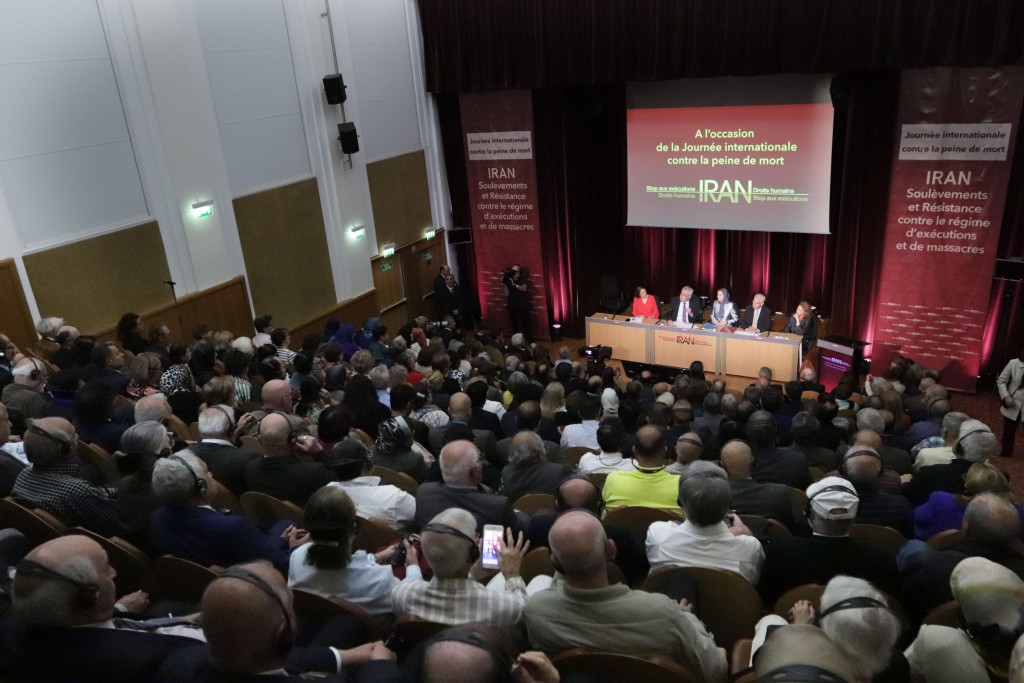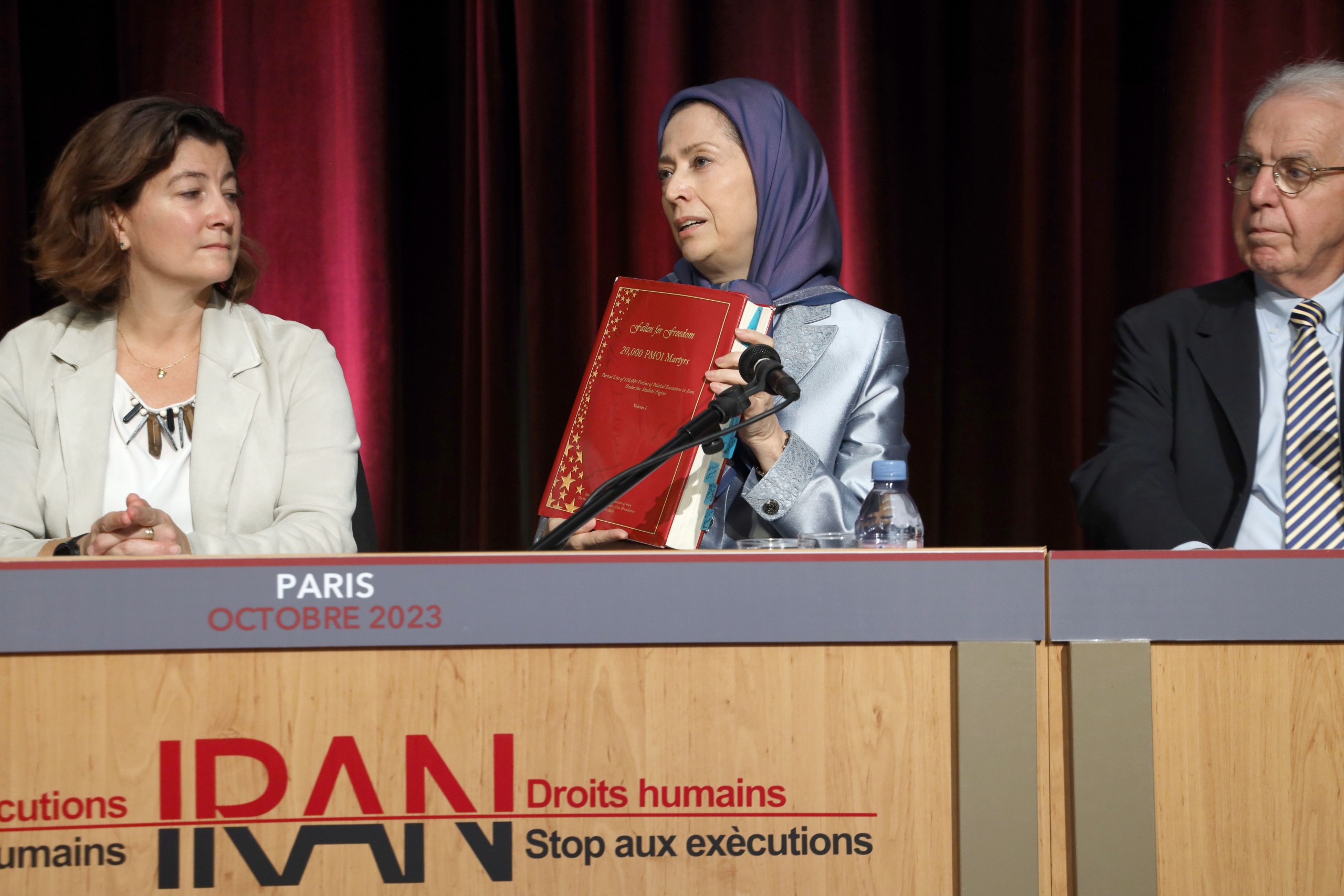Conference in Paris on the World Day against the Death Penalty

Maryam Rajavi: The right policy is to stand up to the regime of executions, terrorism, and warmongering
On Wednesday, October 11, 2023, a parliamentary conference entitled, “Rising Up and Resisting the Regime of Executions and Massacre,” was held in Paris to mark World Day against the Death Penalty. The conference featured Maryam Rajavi, and several members of the French National Assembly and dignitaries who addressed or participated in the conference.
Following is the text of remarks by Maryam Rajavi:
On World Day against the Death Penalty, we honor the memory of 120,000 who laid down their lives for freedom and democracy in Iran. In 1988, the ruling regime massacred 30,000 political prisoners, more than 90% of whom were members of the People’s Mojahedin Organization of Iran (PMOI/MEK). Their crime was that they said no to religious tyranny.
The World Day against the Death Penalty is particularly the day for all humanity to say no to the mullahs. This regime has been the world’s record holder of executions for many years.
According to the report of the UN Secretary-General, 582 people were executed in Iran in 2022, which shows a 75% increase compared to 2021. [1]
This year, the number of executions is even higher.
In its annual report this year, Amnesty International emphasized that the Iranian authorities continue to commit crimes against humanity and that many of its officials, including Ebrahim Raisi, should be criminally investigated.
On this day, I would like to remember my Baluch compatriots. This year, nearly 130 individuals from Baluchistan were hanged.
The mullahs have resorted to quelling the uprisings with the hanging noose. But the question remains, why are France and other European democracies still appeasing this murderous regime?
The secrets behind the appeasement policy
Recently, a network of regime agents was exposed in the US and Europe’s political institutions and government agencies. This revelation exposed the behind-the-scene events of the policy of appeasement. This network actively works at high levels in Washington, DC, Germany, Sweden, and undoubtedly in other countries, including France.
These agents receive their orders directly from the Iranian regime, and their mission is to influence Western governments to:
– Justify the clerical regime’s positions and demands regarding its nuclear program;
– Prevent new sanctions;
– Prevent the terrorist designation of the Revolutionary Guards (IRGC);
– Infiltrate other agents in government positions and as experts in the West.
They spread this big lie that the PMOI/MEK and the National Council of Resistance (NCRI) do not have any base of support inside Iran and are not an alternative.
The disclosure of this network proves the facts that we have said many times:
– That the mullahs’ regime dictates the policy of appeasement.
– The IRGC and the ministries in Tehran produce the lies to justify appeasement.
According to this critical experience, France is expected to take the initiative to expel the regime’s agents from the soil of France and Europe.

European policy on the mullahs’ regime needs to be revised
The time has come to revise European politics.
First, the European Troika’s decision to maintain missile sanctions against the regime is a positive step. But they should not forget to activate the trigger mechanism and restore the six UN Security Council resolutions on the regime’s nuclear projects.
Second, the regime’s access to European markets and universities to facilitate the production of weapons and means of repression should be prevented by strengthening the sanctions regime.
Third, I call on the French National Assembly to follow suit with the European Parliament and several European parliaments and include the IRGC in the terrorist list.
The need to stand against the mullahs’ warmongering
The world must stand against the mullahs’ warmongering. Instrumentalizing the Palestinian issue is a well-known tactic of this deceitful regime. Today, Khamenei and Raisi want to transform the Iranian people’s uprising and struggle against religious fascism in Iran into a Muslim-Jewish war.
They seek a shield and a cover to contain the uprising and preserve the mullahs’ rule. The right policy is to stand against the clerical regime, the foremost state sponsor of terrorism and warmongering.
The 8-year war with Iraq was fought with the slogan “conquering Quds (Jerusalem) via Karbala.” The war left one million dead, 2 million disabled and injured, 4 million displaced, and caused a trillion dollars in material damage on the Iranian side.
In addition to this, there were daily executions, especially of the PMOI/MEK. Khomeini considered the war a “Divine Blessing” that could cover up the executions and repression while preserving his regime.
After the National Liberation Army of Iran (NLA) conquered the city of Mehran, which forced him to accept the ceasefire, Khomeini resorted to massacring political prisoners in prisons across the country and issued a fatwa for the immediate execution of every prisoner who remained loyal to the PMOI/MEK.
Khamenei has openly stated that if the regime does not engage in conflicts in Gaza, Lebanon, Syria, Iraq, and Yemen, it will have to confront the angry people and rebellious youth in Kermanshah, Hamedan, Isfahan, Tehran, and Khorasan.
Khamenei relies on the inaction of Europe and the US when he resorts to warmongering and executions.
The massacre of innocent civilians fuels religious fascism in Iran and serves as a shield and cover to suppress the uprising and avoid its downfall. To achieve peace and freedom, one should target the head of the snake (leadership) in Tehran.
The trend of mullahs’ overthrow will not cease
The regime’s biggest lie is denying the ability of the Iranian people and Resistance for regime change. Despite severe repression, the Iranian uprising and the unique role of the PMOI and Resistance Units demonstrated Iranian society’s capacity to bring down the regime. The trajectory of these developments is trending towards the downfall of religious tyranny. The mullahs cannot stop this trend.
We have never asked the Western governments to change the regime instead of the Iranian people. We demand they stop providing diplomatic and logistical assistance to this religious dictatorship. This fact has been emphasized in the declarations by nearly 400 French National Assembly and Senate members.
Moreover, it is necessary to guarantee the fundamental rights of the residents of Ashraf 3, including the rights stipulated in the 1951 Geneva Convention, the European Convention on Human Rights, and international law. Such rights include freedom of expression and assembly.
Today, the world is convinced that the clerical regime lacks stability and a viable future and is inquiring about the prospects for post-mullah Iran.
The Iranian Resistance is dedicated to a platform that upholds fundamental freedoms, free elections, abolition of the death penalty, gender equality, women’s equal participation in political leadership, an independent judicial system, national autonomy, environmental protection, and a non-nuclear Iran, as well as peace, coexistence, and regional and international cooperation.
The French Declaration of Citizen Rights, the American Declaration of Independence, and the United Nations Universal Declaration of Human Rights have considered uprising and resistance against oppression and tyranny as the right and duty of citizens. We urge the French Parliament and the world to recognize the struggle of the Iranian people to overthrow religious tyranny.
[1] The UN Secretary General’s interim report on the situation of human rights in Iran, June 20, 2023
- Tags: 1988 Massacre, execution, MEK, mullahs' regime, Terrorism

